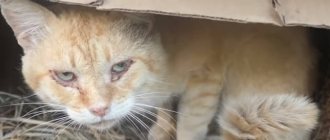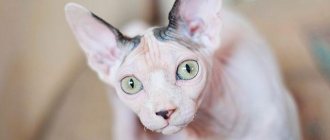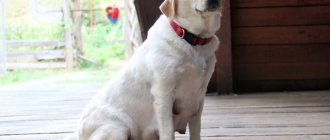How long do British cats live? How to extend the life of a purebred pet? Proper care for an old cat. Stories of happy centenarians.
British cats are graceful, elegant and intelligent. Their body is large, they are stocky and vary in size from medium to large. Female cats can be distinguished by their more graceful build and weight up to 4 kg, while female cats grow to 9 kg or more.
The British have some of the best traits. When you look at them, tenderness and a touching smile appear. Their plump face with a flattened nose is a signature feature of the breed, which they inherited from Persian cats.
The fur of British cats is stuffed with a dense undercoat. They do not require special care. They shed no more than other short-haired relatives. There are many standard colors in the breed. The most popular ones are blue, striped and with white spots.
Despite their cute appearance, such cats have a sense of self-esteem and do not bother you with their presence. They find something to do on their own and get along with other pets without any problems.
They are not picky about food, but they have an excellent appetite. There are individuals with a tendency to gain excess weight and allergies, especially if they have light or completely white fur.
The breed is recognized by the largest felinological organizations. Their standards are largely similar, only the nuances in evaluation and definition of colors differ.
British cats were bred from the Scottish Fold breed. Until recently, they could be crossed with each other. A separate breed of British longhair cats has also appeared.
Life expectancy in British cats
The popularity of this breed is well justified. They have good health and a pleasant and comfortable character.
Attractive appearance also contributes to the growth of love for such pets.
The use of other breeds in breeding indicates genetic diversity.
When choosing a pet, lifespan is always important.
If in many dog breeds the average lifespan is up to 10 years, then in cats the life expectancy often reaches 17-19 years.
This is facilitated by the small size and flexibility of the cat’s psyche. It’s not for nothing that they talk about the 9 lives of a cat.
They recover from falls from great heights and travel across the country for their owners.
Kind attitude of the owner
In one of the episodes of the TV magazine “Yeralash”, a boy screamed so loudly, giving a command to a dog that it “peeed and pooped.” Jokes aside, but there is some truth in this hyperbole. If you constantly expose the animal to stress and punish it for the slightest “offences,” the British cat will not live long. And given their truly British - that is, proud and independent - character, any “assault”, any encroachment on independence will be stressful and will certainly cause a defensive reaction.
The British are reluctant to go into the arms of even their owners, not to mention strangers. This is where their pride and independence manifests itself. Going against their desire to pet and cuddle is not an option. It is also impossible to intimidate the Briton - he will fight to the last.
And such psychological experiments, of course, will not be in vain.
British life expectancy
Siamese cats are considered record holders - they live up to 20 years. The yard animals that were taken into the house are not inferior either. British cats live up to 12-15 years on average. There are long-livers.
This is influenced by a variety of conditions. It is known that large breeds with a rough physique live shorter lives than dry and thin-boned ones. However, genetics plays a big role.
Important: If the pedigree contains a large number of centenarians, then the pet has every chance of crossing the 15-year mark.
The health and ability of the body to recover and endure stress depends on the content. An obese individual almost always has a diseased heart, a poorly functioning liver and stomach. In addition, they are inactive and their metabolism suffers, and they do not receive useful microelements. This shortens the time allotted by nature.
Medical care for the British
The British inquisitive animal lives with an interest in everything it finds in the apartment, independently exploring the space available around it. With this active life, the cat can get into a dangerous situation and cause harm to health. First aid to a cat is provided urgently; the life and health of the pet may directly depend on this.
Your cat will need medical intervention in the following situations:
- Poisoning causes serious consequences:
- Ingestion of spoiled food or chemicals into the stomach;
- inhaled toxic substances in the air;
- licked off harmful adhesion from the surface of the wool.
- A foreign object has gotten inside.
- Electric shock.
- Chemical or thermal burn.
- The presence of heavy bleeding.
Vaccinations
The purpose of vaccination for the British is to protect the body when affected by infections. Animals are vaccinated according to the approved calendar.
Attention! It is a myth that a home-bound Briton who does not leave his apartment does not need to be vaccinated. He can catch the infection from household members.
The first vaccination for the British against infection with microsporia and trichophytosis is given to 2-month-old kittens. A subsequent booster dose is given at 10 weeks of age. In the future, vaccination is carried out annually. 9-12 week old kittens are vaccinated against:
- calcivirosis;
- rhinotracheitis;
- chlamydia;
- Panleukopenia;
- Rabies;
After 11-16 weeks, revaccination is scheduled, and then annually. At 16 weeks, the infectious peritonitis vaccine is administered with a booster dose at 20 weeks. This is the last vaccine, the others have an annual schedule.
Vitamins
The British cat will grow healthy, strong, with fluffy hair when vitamins and microelements are added to the diet. Properties of vitamins on the animal’s body:
- Strengthens physiological processes;
- Protect the body from environmental influences;
- Increases immunity to infections and microbes;
- Speed up the healing process.
- Properties of minerals on the animal body
- Accelerate metabolism
- stimulate proper growth,
- influence development, reproductive function,
- improve the general condition,
- Increases immunity to diseases,
- They have a strengthening effect on all systems of the body: muscular, bone, circulatory.
Attention! Before adding vitamins and microelements to a Briton’s diet, consult a veterinarian.
How to extend the life of a pet
A person must feel responsible. The main attention in keeping cats is paid to nutrition, but many forget about activity. Lack of moderate exercise threatens health problems.
There are cases when a cat eats food from the table, bones or low-quality food, sits or sleeps in the same room all the time and leaves for another world at an advanced age.
However, its resources are used to the limit. If he had eaten a balanced diet, moved more often and been in the fresh air, he would have lived for many more years.
To support your pet you need:
- Feed him correctly;
- Provide physical activity;
- Provide timely veterinary care;
- Carry out disease prevention;
- Take care of your psychological state.
Simple rules are easy to implement. Owners get used to changes in life in no more than 1 month, but then they are taken for granted, and a pet of the British Fold breed pleases with health and good mood.
According to the observations of many breeders and veterinarians, castrated cats live longer. Perhaps this is due to the lack of permanent stress in males when they are in search of a lady of their heart. In cats it is also associated with attraction and childbirth.
They no longer need to recover after bearing and feeding offspring, and precious resources are preserved.
Important: Reproductive capacity is maintained in all cats until the end of their days. An unneutered cat without pregnancy runs the risk of developing serious health problems, such as tumors and hormonal imbalance. Because of this, it is recommended that pets be spayed or neutered.
Protect British cats from stress. Reduce the risk of injury by limiting their movement on the street. However, pets need fresh air and sunlight, so they are walked or allowed on the balcony, loggia, or terrace in warm weather.
Important: Vaccinations help reduce the risk of premature death. Panleukopia, calcevirosis, rhinotracheitis and rabies are dangerous and contagious diseases.
What can you do?
Many owners who, of course, love their furry friend can help ensure a long and happy life.
If you want this, then follow some of the rules below:
- Everyone needs fresh air! Therefore, periodically walk your pet, let it out onto the veranda or balcony;
- the British need grass, vitamins and various food additives;
- active life! Play with your animal more often, give him the opportunity to run and jump, as much as he wants;
- quality nutrition should come first! For such purebred cats, be sure to buy expensive premium food.
So, let's go into more detail. In order for your kitten to have a rich and long life, he needs fresh air. His immunity will be strengthened when he can breathe fresh oxygen.
Being active is also good for the lives of animals. Therefore, owners and all household members should play with their British cat. Balls, ropes, lasers and other objects will help you with this. You can build shelves against the wall that will help your pet climb heights in your home.
Good quality fresh water and food contributes to a cat's longevity. Therefore, you should often wash and change bowls, buy fresh and high-quality products. If the owners decide to feed the British cat breed with natural food, then it is worth buying lean meat.
For their diet, chicken or beef is best suited. If the owners of a kitten want to feed it dry food, then they should buy those specifically designed for the British breed. Typically, such high-quality food comes in slightly smaller sizes than others.
And this is due to the fact that this breed has flattened and small jaws, so it is easier for them to chew small food. Or you can purchase wet food for this breed of animal.
However, remember that such food should be expensive and from a trusted company, because only such food contains vitamins, minerals and meat, which are so necessary for a healthy body.
It is also important for pets to receive various vitamins. There are many varieties of them, for example, for neutered cats, for improving coat, for strong bones and teeth, and so on.
Therefore, you can consult with a specialist at a pet store or with an experienced veterinarian to choose the best and necessary for your kittens.
By following the above guidelines and taking good care of your British cat, you can help him live a long and happy life!
Caring for an Old British Cat
They reach old age after 8-9 years. It is generally accepted that a 7-year-old cat is equivalent to a 44-year-old woman. After 8 years or earlier, it is necessary to change the diet, reduce the amount of fat in it, and protect the pet from stress.
Examinations are carried out more often. It is at this age that previously hidden diseases worsen and excess weight appears. For prevention, walks at a calm pace and short games are needed.
Bones become fragile, after 12-13 years many British cats suffer from hearing loss, deafness and eye diseases.
Sometimes the young animal returns to playfulness and excitement. A sense of competition or maternal instincts force the old cat to accumulate strength and not relax. For some individuals, the arrival of a new resident is stressful.
It is worth remembering that each animal has an individual set of genes, health and psyche. Even within the same litter, kittens with different characters and stamina are born.
Skin diseases
Problems with the fur that cause skin diseases in the British dog often worry owners of elite pets. With careful care of animals, symptoms are detected immediately. The reasons for infection are:
- Parasites appear on the skin, such as lice, fleas, and ticks, which the pet could pick up on a walk or from the owner’s objects. If there are fleas or lice, the animal behaves restlessly, scratches parts of the body in different places, insects can be seen with the naked eye;
- Ear mites cause irritation in the ears, dark discharge appears from them, and the pet constantly scratches its face with its paws.
- Skin fungal diseases are common in animals. Ringworm is a dangerous, contagious disease for cats, manifesting itself in the form of redness on bald spots, with flakes of skin that are confused with dandruff.
- Fungal parasites, mycoses parasitize mucous membranes and skin, diagnose fungal dermatitis, stomatitis, which are contagious.
- Allergic reactions also cause itching, redness and scratching of the skin.
Attention! To prescribe the correct treatment for skin diseases, contact a veterinarian-dermatologist.
Correct, timely administration of drug treatment leads to the recovery of pets:
- against parasites: lice, fleas, ticks, special antiparasitic sprays, ear drops, collars.
- for fungi, serous, zinc, antifungal ointments are used;
- To get rid of allergies, steroids are prescribed, wounds are healed with sprays and creams;
- requires medications to boost immunity.
The pet's belly hangs
What worries owners is that the Briton has a hanging belly. This condition does not always indicate a serious illness. The basis for the formation of a hanging abdomen are different reasons:
- The skin of the abdomen sags, which is a normal natural formation and is explained by the physiology of the animal;
- Frequent childbirth with large offspring leads to stretching of the uterus and abdominal walls;
- Old age. In older cats, the skin becomes flabby, the abdominal cavity sags over time;
- A fat fold on the belly, a fat tail, is the norm among British food lovers.
- Frequent constipation also stretches the lower abdomen.
- A hanging belly often becomes a symptom of a serious disease. Dangerous signs of illness are determined by the following signs:
- worms form a colony in the intestines and stomach of an adult pet, which leads to bloating and constipation. Itching of the anus indicates the presence of worms;
- oncological disease of the gastrointestinal tract will cause sagging of the abdomen, which causes pain, rumbling, and fever;
- Infectious peritonitis causes inflammation in the abdominal cavity. This leads to serious consequences, refusal to eat, fever, convulsions, and breathing problems.
- Pyometra occurs when an infection is introduced into the uterus after childbirth, which causes purulent inflammation of the uterus with vaginal discharge and pain in the peritoneum;
- An inguinal or umbilical hernia can be hereditary or acquired, which causes damage to muscle tissue and the appearance of a soft formation on the abdomen
- — Cushing's syndrome occurs when changes in the production of the hormone cortisol, which leads to an increase in the volume of the abdomen and a deterioration in the general condition of the pet.
Record holders among cats
Since the British have an average lifespan, representatives of this breed were not included in the list of record holders. Ordinary cats from England, which is their homeland, often live up to 20-30 years. Perhaps the good performance of the British is associated with this factor.
A cat named Spike from a simple English village lived for about 30 years. At the age of 19, he was seriously injured in a fight with local guard dogs and was close to death. He managed to get back on his feet and continue his adventures around the area.
Another centenarian from England with the laconic nickname Ma has surpassed the age of 34. Her breed is unknown, but she was tabby and until the end of her days she performed the duties of catching mice and other pests.
A little history
Today, there are several versions of the appearance of this breed. Professional felinologists are still arguing which one is more reliable. Those who want to understand how long the British cat lives will be interested in the most mysterious story. According to some reports, these are the same animals that once lived in Rome and Egypt. They were brought to the territory of the British Isles by legionnaires.
Despite the fact that the British for a long time considered them ordinary yard animals, these aristocratic beauties managed to climb to the very top of the feline class system. On July 13, 1871, the first cat exhibition took place in London, which won the approval of the Queen of England herself, who owned two blue Persians. One of the participants in this event was a mouse-colored English Shorthair. It is from this moment that we can talk about the appearance of the British breed.
We recommend reading: Dog has Parkinson's
Preparing for castration
This is an operation under general anesthesia. Local is undesirable, as it does not eliminate pain, and it is difficult to fix the cat. Preparation includes:
- Finding an experienced doctor;
- Inspection and analysis;
- Purchasing accessories and medications for follow-up care.
A qualified doctor will carefully examine your pet and check its heart with an ultrasound.
Important: Anesthesia is not detrimental to a healthy British cat, but if there is a predisposition to heart problems, they will certainly appear.
The operation is performed only in a hospital setting. It is impossible to achieve the cleanliness required for intervention at home. There are no tools or drugs for unexpected complications.
Immediately after surgery you will need:
- Soft and wide bedding;
- Absorbent diapers;
- Plastic collar;
- Zelenka or any preparation for treating seams;
- Cotton buds.
The collar is put on to prevent the cat from licking the seams. The first hours after anesthesia, the cat drools, and a little later it is possible to urinate, which he does not control. To do this, diapers are placed on the sunbed.
Life expectancy after surgery depending on breed
How long do dogs live at home: table by breed
There are a huge number of cat breeds; when purchasing a pet, you need to know how long it will live.
Long-livers are outbred individuals and mestizos; in history there have been many cases when they lived to be 22-25 years old.
Let's look at how long the most popular cat breeds live after castration.
How long do Siamese live?
The Siamese breed lives on average 13-16 years.
The Siamese cat lives a long time
The lifespan of a Siamese cat and any other breed depends on diet, frequency and amount of feeding, care and living conditions, and genetic predisposition to diseases.
It has been established that sterilized cats live longer in warm, heated apartments or houses, while their relatives living in cool rooms live less.
And others
Average life expectancy for long-haired breeds:
- Persian - 15-20 years;
- longhaired British - 10-15;
- Maine Coon - 13-16;
- Burmese - 15;
- Neva Masquerade - 13-16;
- Siberian - 20;
- snowshoe - 9-11;
- Kurilian bobtail - 12-17.
In short-haired breeds:
- Abyssinian - 15 years;
- British Shorthair - 10-15;
- Thai - 20;
- Bombay - 12;
- Russian blue - 12;
- Scottish Straight - 15;
- exotic shorthair - 9-13;
- Manx - 20;
- sphinx - 15;
- Scottish fold - 15-20.
In some breeds, life expectancy differs by 3-4 years or more. It all depends on what kind of care the owner provides for the pet.
Does lifespan depend on breed?
Different cat breeds have different life expectancies. This is due to the genetic characteristics of a particular breed.
British cats are naturally endowed with good health, strong immunity, and a powerful body. They eat little. Veterinarians do not recommend training these animals to eat large amounts of food. These cats can live up to 15 years, and castrated individuals - up to 16-17.
Persian cats are also long-lived: with proper care, neutered pets can live up to 18 years.
The life of outbred cats after the castration procedure can last 1-1.5 years.
The attentive attitude of owners to the health of their pets, proper nutrition, timely seeking veterinary help - all these aspects affect how long cat breeds can live at home.











